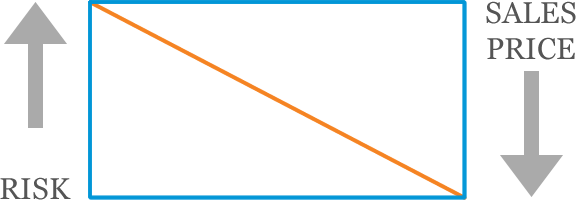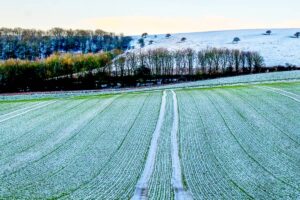In order for a seller to command top dollar for the sale of a property, a buyer must generally be very certain of what they are purchasing. The degree of certainty, or the comfort level, the buyer has with a given property often directly affects the price they are willing to pay.
“Markets hate uncertainty” is a saying we’ve all heard dozens of times in the past few years. The real estate market is also not averse to the animosity towards uncertainty. In financial terms, uncertainty equals risk.
This past week I took a course offered by the Realtors Land Institute on Land Investment Analysis. The instructor, Fletcher Majors, expressed the idea that helping a buyer become certain about a prospective purchase increases the likelihood of their investment. I’ve had this thought many times, but never had a concise way of articulating it. Certainty makes the sale.
There are many different types of risk associated with any given property, but I deal with a few that frequently affect a buyer’s interest level:
- Access- Does the property have road access or at least a deeded access? In Alabama, 95% of the time land lenders will not loan money on a tract that is land-locked. Without legal access, even the lender is not willing to take a risk on a property.
- Soil types- Buyers I deal with are usually looking for a timberland investment or an agricultural property. They want to know about the suitability of the soils for their intended purpose. Good timberland needs a high site index for the tree species they want to grow, and farmland also needs to be suitable for the purpose of the farmer.
- Mineral Rights- Does the current owner of the land also own the mineral rights? This matters to many prospective buyers because they want to know if someone will come put an oil derrick in their front yard.
And the list could go on indefinitely.
The purpose of this article is to show that the more information you can provide to a potential purchaser up front, the more likely you are to make a sale. In my experience the more risk a property poses to a prospective buyer, the less money they are willing to offer for it. Please see the chart below that I’ve used to illustrate this point: the lower the risk, the higher the sales price, and inversely, the greater the risk, the lower the sales price.

With the exception of institutional land investors, land investment is usually a matter of personal finance. People buy land. People need good information to buy a piece of property. Generally your average buyer of a small to medium sized property has a fairly low tolerance for risk with their land purchases. They want to be pretty certain about what they are purchasing. The proof of that is that most buyers (I deal with) make sure they have a clear title to a property and get an owner’s title insurance policy for extra peace of mind.
Sellers and agents will benefit from the maxim: certainty makes the sale. The more good information we can provide to prospective buyers, the greater the likelihood that we can sell them a property.
This content may not be used or reproduced in any manner whatsoever, in part or in whole, without written permission of LANDTHINK. Use of this content without permission is a violation of federal copyright law. The articles, posts, comments, opinions and information provided by LANDTHINK are for informational and research purposes only and DOES NOT substitute or coincide with the advice of an attorney, accountant, real estate broker or any other licensed real estate professional. LANDTHINK strongly advises visitors and readers to seek their own professional guidance and advice related to buying, investing in or selling real estate.









In our office, we often say that answers equal better prices and faster sale while questions equal lower prices and slow or no sale. It takes a lot of work to get all the answers (high certainty) before putting a property on the market. We try to even get pre-sale title work done so we can determine if there are any title issues to be addressed. Access is an ongoing issue in the forestlands of North Central Minnesota with many parcels surrounded by county, state or federal lands. Buyers can’t assume because there’s physical access that there’s insurable access to a property.